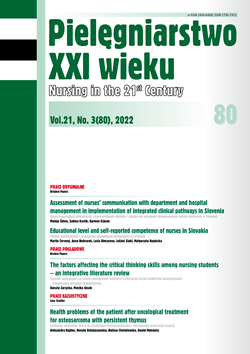Educational level and self-reported competence of nurses in Slovakia
DOI:
https://doi.org/10.2478/pielxxiw-2022-0028Keywords:
nurses, competence, quality of healthcare, Slovakia, self-evaluationAbstract
EDUCATIONAL LEVEL AND SELF-REPORTED COMPETENCE OF NURSES IN SLOVAKIA
Aim. The aim of this study was to explore the relationship between self-reported competences and the educational level of nurses in Slovakia.
Materials and methods. The 73-item NCS was translated into the Slovak language according to Brislin’s translation model, then electronic version of the tool was emailed to eligible nurses in the Slovak Republic registered with the Slovak Chamber of Nurses and Midwives (SkSaPA). Data were analysed in IBM SPSS version 22 using descriptive statistics, Student t-test, Kolmogorov-Smirnov, and Mann-Whitney U test.
Results. A total of 135 nurses, who work in the Slovak healthcare system, returned the surveys. Nurses with master’s degree reported greater confi dence in “ensuring quality” and higher competence on the “managing situations” subscales than nurses without a master’s degree. This study found no other signifi cant relationships between nursing educational levels and self-reported competence.
Conclusions. Master’s level education infl uences nursing competence in managing clinical situations and ensuring the quality of nursing care provided in Slovakia
References
1. Kajander-Unkuri S, Salminen L, Saarikoski M, et al. Competence areas of nursing students in Europe. Nurse Educ Today. 2013; 33(6): 625-32.
2. European Federation of Nurses Associations. 2015. EFN Guideline for the implementation of Article 31 of the Mutual Recognition of Professional Qualifications Directive 2005/36/EC, amended by Directive 2013/55/EU. Retrieved October 20, 2021 from http://www.efnweb.be/wp-content/uploads/EFN-CompetencyFramework-19-05-2015.pdf
3. Meretoja R, Leino-Kilpi H. Comparison of competence assessments made by nurse managers and practising nurses. J Nurs Manag. 2003; 11(6): 404-9.
4. Intitute of Medicine of the National Academies. 2010. A Summary of the February 2010 Forum on the Future of Nursing. Retrieved October 19, 2021 from https:// www.nap.edu/catalog/12894/a-summary-of-the-february-2010-forum-on-thefuture-of-nursing
5. Wilkinson J, Carryer J, Budge C. Impact of postgraduate education on advanced practice nurse activity – a national survey. Int Nurs Rev. 2018;65(3):417-424.
6. Tóthová V, Sedláková G. Nursing education in the Czech Republic. Nurse Educ Today. 2008;28(1):33-38.
7. Liao L M, Sun X Y, Yu H, et al. The association of nurse educational preparation and patient outcomes: Systematic review and meta-analysis. Nurse Educ Today. 2016;42:9-16.
8. Finn F L, Fensom S A, Chesser-Smyth P. Promoting learning transfer in post registration education: a collaborative approach. Nurse Educ Pract. 2010;10(1):3237.
9. Kilíková M, Hrindová T, Červený M. Az ápolók hatáskörének és jogkörének a szabályozása a szlovákiai egészségügyben [Regulation of nurses’ competence in Slovak health care]. Nővér – A Hungarian Journal of Nursing Theory and Practice. 2019;32(3):32-39.
10. Slovak Chamber of Nurses and Midwives. 2020. Informačný Bulletin [Information Bulletin]. Retrieved October 20, 2021from https://www.SKSaPA.sk/informacnybuletin/bulletin-61.html
11. Meretoja R, Isoaho H, Leino-Kilpi H. Nurse competence scale: development and psychometric testing. J Adv Nurs. 2004;47(2):124-133.
12. Brislin RW. Back-translation for cross cultural research. J Cross Cult Psychol. 1970;1(3):185-216.
13. World Medical Association. World Medical Association Declaration of Helsinki: ethical principles for medical research involving human subjects. JAMA. 2013;310(20):2191-2194.
14. Official Journal of the European Union. 2016. Regulation (EU) 2016/679 of the European Parliament and of the CounciL of 27 April 2016 on the protection of natural persons with regard to the processing of personal data and on the free movement of such data, and repealing Directive 95/46/EC (General Data Protection Regulation). Retrieved October 19, 2021from https://eur-lex.europa.eu/legal-content/EN/TXT/ HTML/?uri=OJ:L:2016:119:FULL&from=EN
15. Sibandze BT, Scafide KN. Among nurses, how does education level impact professional values? A systematic review. Int Nurs Rev. 2018;65(1):65-77, 10.1111/inr.12390
16. Silvennoinen A S, Salanterä S, Meretoja R, Junttila K. Sairaanhoitajan ammatillinen p€atevyys ja siihen yhteydessä olevat tekijät perioperatiivisessa hoitotyössä. Tutkiva Hoitotyoä. 2012;10(3):22-31.
17. Marchetti A, Venturini G, Virgolesi M, et al. Tuning Nursing Educational in an Italian academic context. Nurse Educ Today. 2015;35(9):e19-e25.
18. Kajander-Unkuri S, Koskinen S, Brugnolli A, et al. The level of competence of graduating nursing students in 10 European countries – Comparison between countries. Nurs Open. 2020;8(3): 1048-1062.https://doi.org/10.1002/nop2.712
19. Istomina N, Souminen T, Razbadauskas A, et al. Competence of nurses and factors associated with it. Medicina (Kaunas). 2011;47(4):230-7.
20. Kirca N, Ozgunul Levent M, Bademli K. The relationship between the competence of nurses and their attitudes in medical errors: a cross-sectional survey. J Nurs Manag. 2020;28(5): 1144-1152.
21. Jansson J, Josse Eklund A, Larsson M, et al. Prehospital care nurses’ self reported competence: A cross-sectional study. Int Emerg Nurs. 2020;52:100896,
22. Grešš-Halász B, Majerníková Ľ, Hudáková A, et al. Developing the advanced practice nursing role in Slovakia: Perception, education, and practice. J Am Assoc Nurse Pract. 2021;33(11):916-923.
Downloads
Published
Issue
Section
License
Copyright (c) 2022 Authors

This work is licensed under a Creative Commons Attribution 4.0 International License.




